Over the decades, television has brought audiences countless unforgettable moments, captivating stories, and iconic characters.
From groundbreaking dramas that reshaped the medium to laugh-out-loud comedies that became household staples, the best TV shows of all time have left an indelible mark on pop culture. These series span genres and generations, uniting fans with their compelling narratives, innovative storytelling, and unparalleled performances.
Whether it’s the suspenseful twists of a crime thriller, the heartwarming camaraderie of a sitcom, or the sprawling worlds of fantasy and sci-fi, these shows continue to stand the test of time, earning their place in entertainment history.
10. The Simpsons
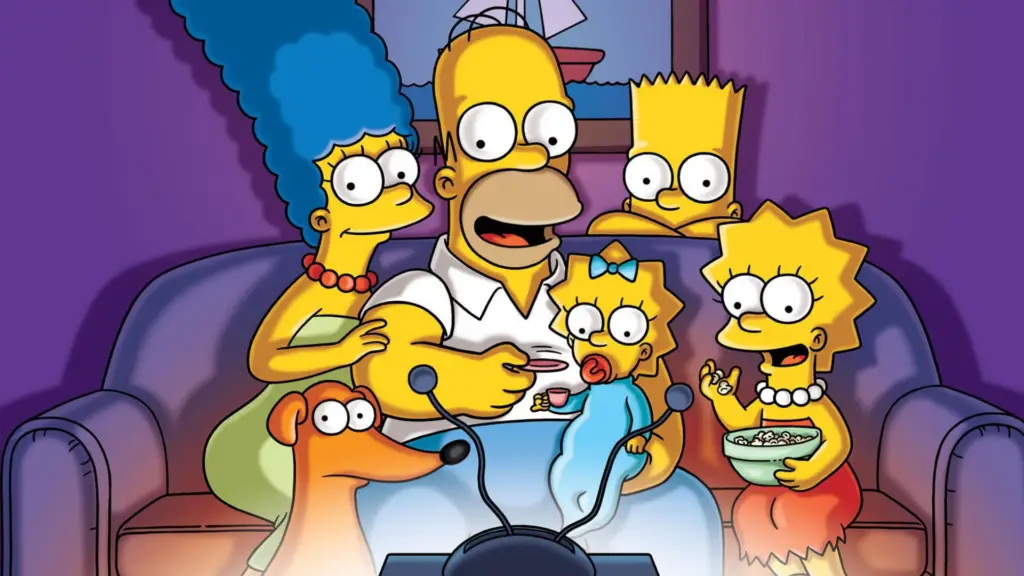
| TV Channel | ABC |
| Aired | 1989-present |
| No. of Seasons | 36 |
The Simpsons is an animated sitcom that has since become the longest-running American TV series. Created by Matt Groening, the show follows the lives of the Simpson family—Homer, Marge, Bart, Lisa, and Maggie—as they navigate suburban life in the fictional town of Springfield. The Simpsons revolutionized television by blending satire, humor, and social commentary with sharp wit, becoming a cultural touchstone for multiple generations. Its influence on TV is immense, as it pioneered the primetime animated series format and paved the way for other adult-oriented animated shows like South Park and Family Guy.
The show’s ability to tackle a wide range of issues, from politics to pop culture, while maintaining broad appeal, has solidified its place in television history. Its success also marked a shift in animated programming, showing that cartoons could engage adult audiences with both clever humor and insightful social critique.
9. Lost
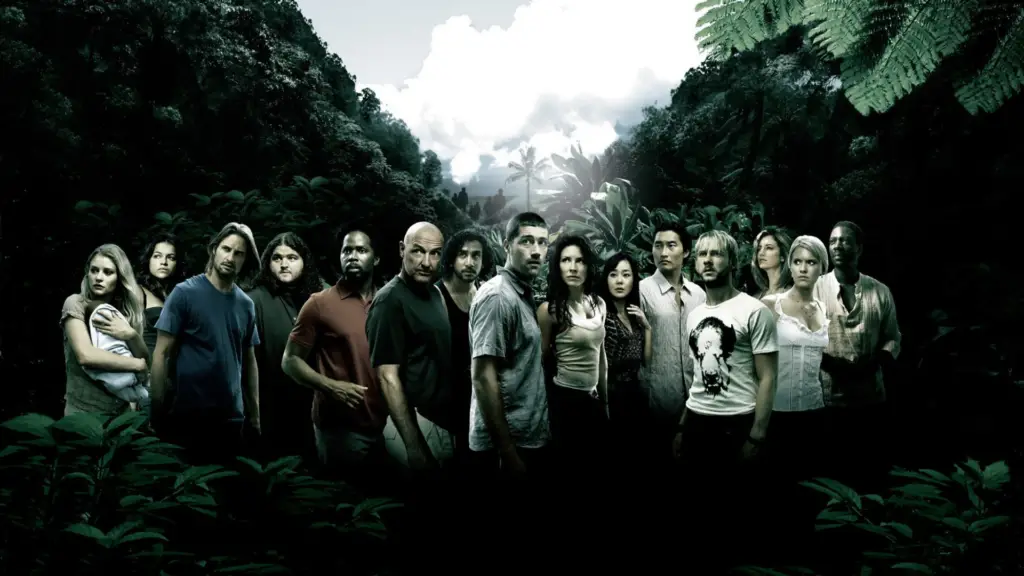
| TV Channel | ABC |
| Aired | 2004-2010 |
| No. of Seasons | 6 |
Lost is a mystery-drama that follows a group of survivors stranded on a mysterious island after a plane crash.
Known for its complex narrative structure, Lost blended elements of science fiction, drama, and adventure, often shifting between the island’s present-day events and flashbacks that revealed characters’ backstories.
The show’s embrace of intricate, long-form storytelling and its use of cliffhangers and plot twists set a new standard for serialized television. Lost’s impact on TV is profound, as it helped popularize the modern era of complex, character-driven shows with overarching plots that required viewers to commit to watching over multiple seasons.
It also helped usher in the era of “appointment television,” where viewers tuned in weekly to discuss and theorize about each new episode, laying the groundwork for future shows with similarly ambitious narratives.
8. The Office

| TV Channel | NBC |
| Aired | 2005-2013 |
| No. of Seasons | 9 |
The Office (U.S.) is a mockumentary-style sitcom that portrays the everyday lives of office employees at the Dunder Mifflin paper company. Created by Greg Daniels and adapted from the British series by Ricky Gervais and Stephen Merchant, the show became a cultural staple thanks to its unique blend of awkward humor, relatable characters, and memorable moments.
What makes The Office great is its use of the mockumentary format, which allows for intimate, hilarious character-driven storytelling, often breaking the fourth wall with confessional interviews. Its characters, like the lovable but cringeworthy Michael Scott and the understated Jim and Pam, became iconic in television history. The Office had a major historical impact on TV by popularizing the mockumentary format and influencing the rise of character-driven comedies.
It also paved the way for a new wave of workplace sitcoms that favored humor derived from everyday situations and quirky personalities. Its relatable humor, endearing characters, and sharp writing have made it a beloved show that continues to resonate with audiences through its widespread syndication and streaming availability.
7. The Wire
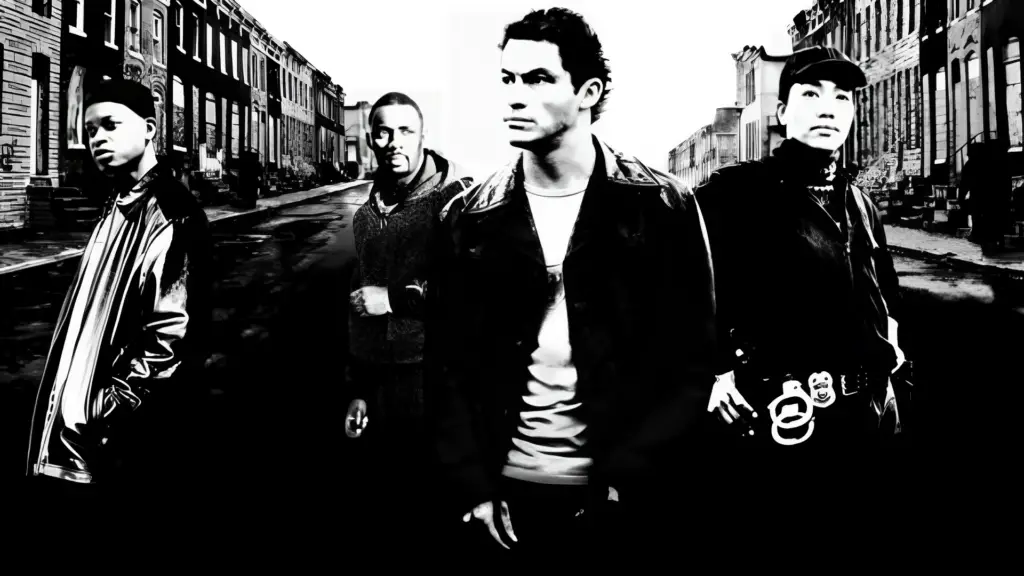
| TV Channel | HBO |
| Aired | 2002-2008 |
| No. of Seasons | 5 |
The Wire is a gritty, realistic crime drama that explores the intersections of law enforcement, politics, and urban life in Baltimore, Maryland. What set the show apart was its unflinching portrayal of societal issues, focusing not just on the drug trade but also on the systemic failures in institutions like schools, the police, and the government. The show’s nuanced characters, intricate plotting, and exploration of social and economic inequality made it an outstanding work of television.
Its historical impact is profound, as it shifted the medium from mere entertainment to a platform for social commentary, influencing countless other shows in its wake. The Wire has been praised for its authenticity, deep storytelling, and ability to examine complex issues, marking a significant turning point in the evolution of TV drama.
6. Seinfeld
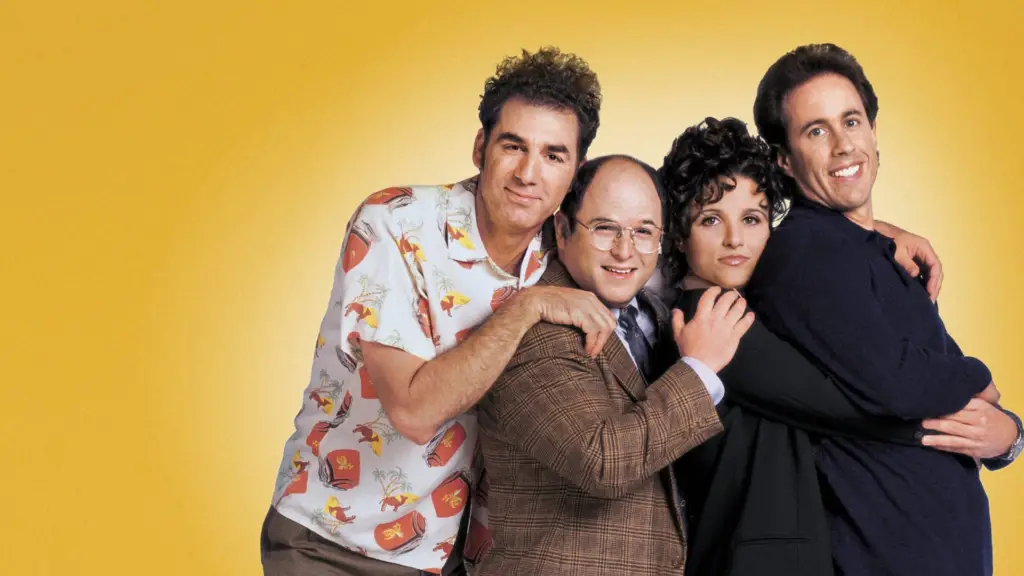
| TV Channel | NBC |
| Aired | 1989-1998 |
| No. of Seasons | 9 |
Seinfeld, created by Larry David and Jerry Seinfeld, is often hailed as one of the greatest sitcoms of all time.
Known as “a show about nothing,” Seinfeld broke the mold of traditional sitcoms by focusing on the mundane, everyday life of its neurotic characters—Jerry, George, Elaine, and Kramer—and finding humor in the smallest of social observations. Seinfeld is highly respected for its sharp writing, impeccable comedic timing, and the way it elevated observational humor to new heights, often exploring absurdities in ordinary situations.
Its historical impact on TV is profound, as it helped shape the “low-concept” sitcom, where the focus is on character interactions and quirky humor rather than plot-driven narratives. Seinfeld revolutionized TV comedy by showing that a sitcom could succeed without a clear moral lesson or formulaic structure, influencing countless shows that followed in its wake. Its influence endures, with many considering it a defining moment in the evolution of television comedy.
5. Buffy the Vampire Slayer
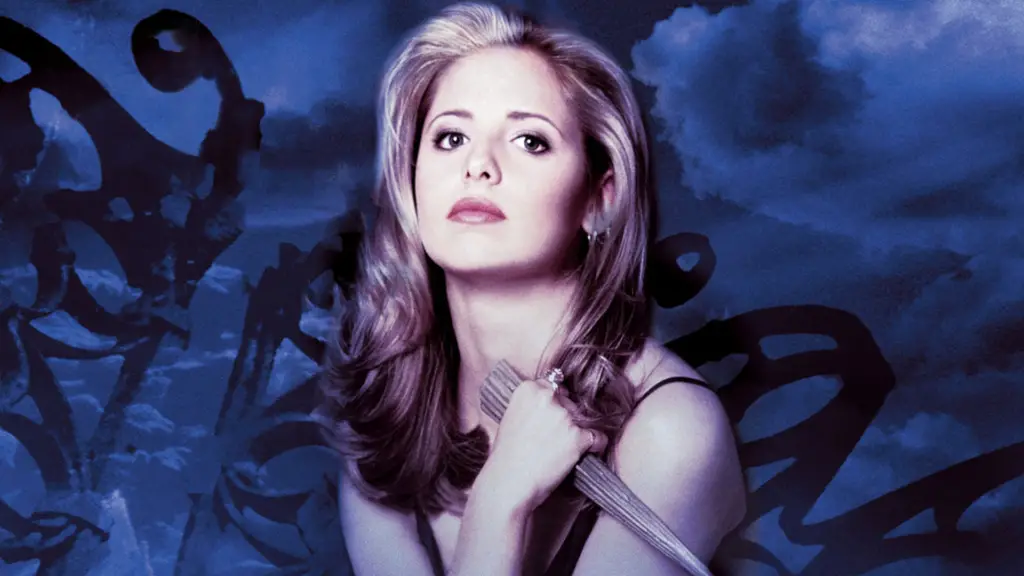
| TV Channel | The WB / UPN |
| Aired | 1997-2003 |
| No. of Seasons | 7 |
Buffy the Vampire Slayer, which aired from 1997 to 2003, is a cult favorite show blending horror, comedy, and drama to tell the story of Buffy Summers, a high school student and “slayer” chosen to battle vampires and supernatural forces. Created by Joss Whedon, the show became a huge success for its witty dialogue, empowering themes, and strong, multidimensional female lead.
What makes Buffy so damn great is its unique combination of monster-of-the-week episodes and complex, long-term character development, particularly Buffy’s struggle to balance her supernatural duties with her personal life. Its historical impact on TV is significant in how it subverted traditional gender roles and addressed themes such as identity, trauma, and empowerment.
The series helped pave the way for more genre-defying shows with strong, independent female characters and influenced a generation of writers and creators to embrace genre-bending storytelling. Buffy remains a touchstone for both fans and the industry, shaping TV’s approach to young adult narratives, supernatural drama, and feminist representation.
4. Game of Thrones

| TV Channel | HBO |
| Aired | 2011-2019 |
| No. of Seasons | 8 |
Game of Thrones, based on George R.R. Martin’s A Song of Ice and Fire series, aired from 2011 to 2019 and became a cultural phenomenon. Set in the fictional continents of Westeros and Essos, it follows the intricate power struggles among noble families vying for control of the Iron Throne.
Known for its complex characters, shocking plot twists, and sprawling world-building, Game of Thrones redefined the scope and ambition of television storytelling. Its historical impact on TV includes raising the bar for production values, particularly in terms of epic fantasy, sex, gore, and action sequences.
The show also popularized long-form storytelling with rich character arcs and morally gray narratives, influencing numerous subsequent series to embrace complex narratives, large ensemble casts, and high-stakes drama. Game of Thrones’ massive success helped establish HBO as a dominant force in prestige television and elevated the genre to mainstream popularity.
3. Star Trek: The Next Generation
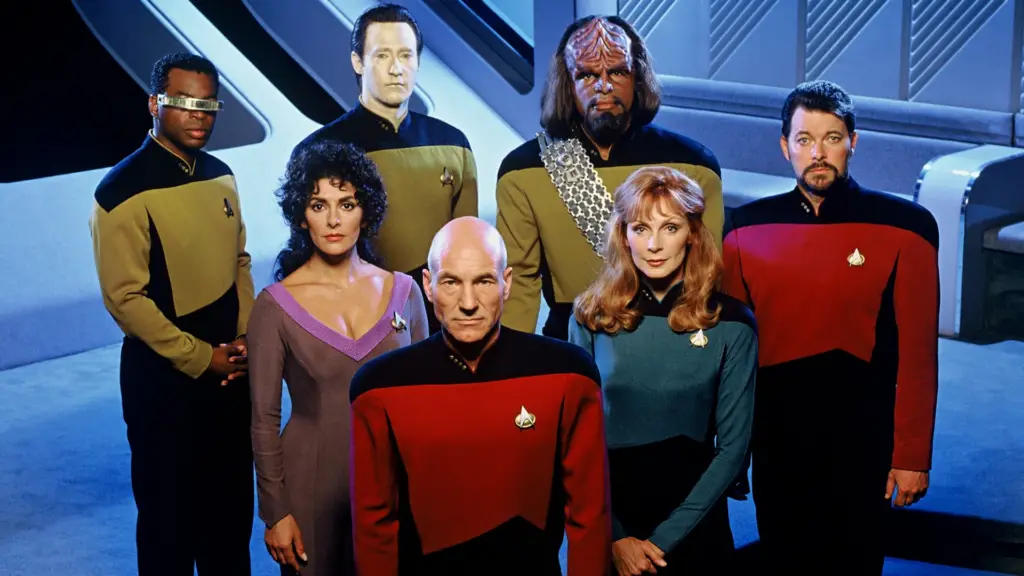
| TV Channel | CBS |
| Aired | 1987-1994 |
| No. of Seasons | 7 |
Star Trek: The Next Generation (TNG) is a science fiction series set in the 24th century aboard the starship USS Enterprise. Created by Gene Roddenberry, TNG built on the legacy of the original Star Trek while introducing new characters, technology, and a more sophisticated approach to storytelling. The series explored philosophical, ethical, and social issues through its futuristic lens, addressing topics such as artificial intelligence, diplomacy, and diversity.
TNG’s historical impact on TV lies in its ability to blend complex, thought-provoking themes with entertaining space exploration, inspiring a new era of science fiction television. It helped redefine the genre and broadened the appeal of speculative fiction to mainstream audiences, laying the groundwork for future successful TV franchises and inspiring a devoted fanbase that continues to thrive.
2. The Sopranos
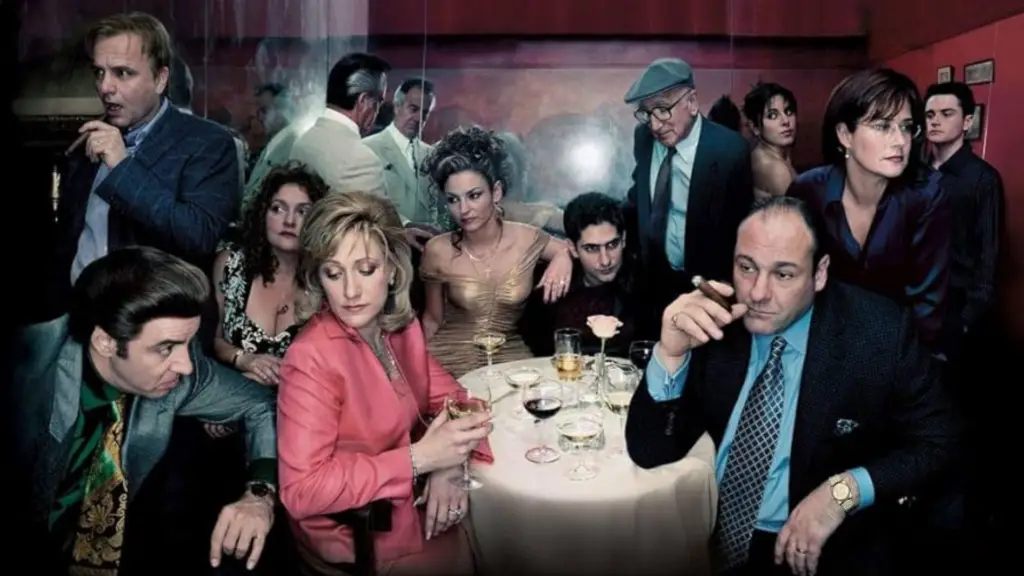
| TV Channel | HBO |
| Aired | 1999-2007 |
| No. of Seasons | 6 |
The Sopranos is a classic mafia drama series that can proudly say it singlehandedly established serial television as a medium. It brought audiences of every walk of life to the small screen, delivering a gripping narrative focusing on the trials and tribulations of New Jersey mob boss Tony Soprano and the DiMeo crime family.
Aside from the traditional action, fisticuffs, drugs, sex, betrayal, murder, fancy clothes, and protection racketeering that come from mob shows, what truly captivated audiences about The Sopranos was the character of Tony. In spite of his alpha male demeanor, he was very relatable as someone who regularly attended therapy; suffering panic attacks and ongoing childhood trauma related to his sociopathic mother.
Its deep exploration of mental health, power dynamics, and identity redefined what was possible in serialized storytelling, paving the way for the golden age of television. The show’s success helped solidify the rise of premium cable networks, encouraging more adult-oriented, character-driven content and influencing a generation of television writers and creators.
1. Breaking Bad

| TV Channel | AMC |
| Aired | 2008-2013 |
| No. of Seasons | 5 |
All Hail The King. Breaking Bad is an unforgettable crime drama that follows Walter White, a high school chemistry teacher from Albuquerque, New Mexico turned methamphetamine kingpin, as he descends into the criminal underworld. Created by Vince Gilligan, the series was widely praised for its intense storytelling, complex characters, and moral ambiguity.
Bryan Cranston, an actor who previously was famous for portraying Hal, the stereotypical “American Dad in his underwear”, on Malcolm in the Middle, masterfully proved to audiences why typecasting is bad practice with this incredible series. He transforms the character of Walter White from someone who was struggling financially and taken advantage of to a dark, ruthless drug lord capable of taking down an entire mafia.
More than anything, Breaking Bad and its prequel series, Better Call Saul, aim to answer the question of why people become criminals, and how criminal behavior in and of itself is not evil, but rather a choice.
Breaking Bad revolutionized TV by pushing the boundaries of what was possible in terms of character development and narrative complexity. It marked a shift toward “antiheroes” as protagonists and was instrumental in the rise of prestige television, influencing countless shows that followed. Its impact on TV is immeasurable, with many considering it one of the greatest series ever made, thanks to its sharp writing, memorable performances, and lasting cultural influence.

